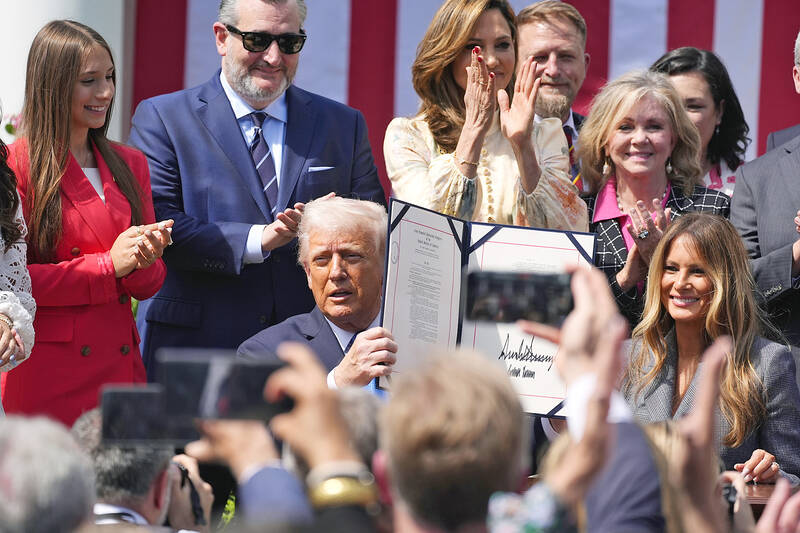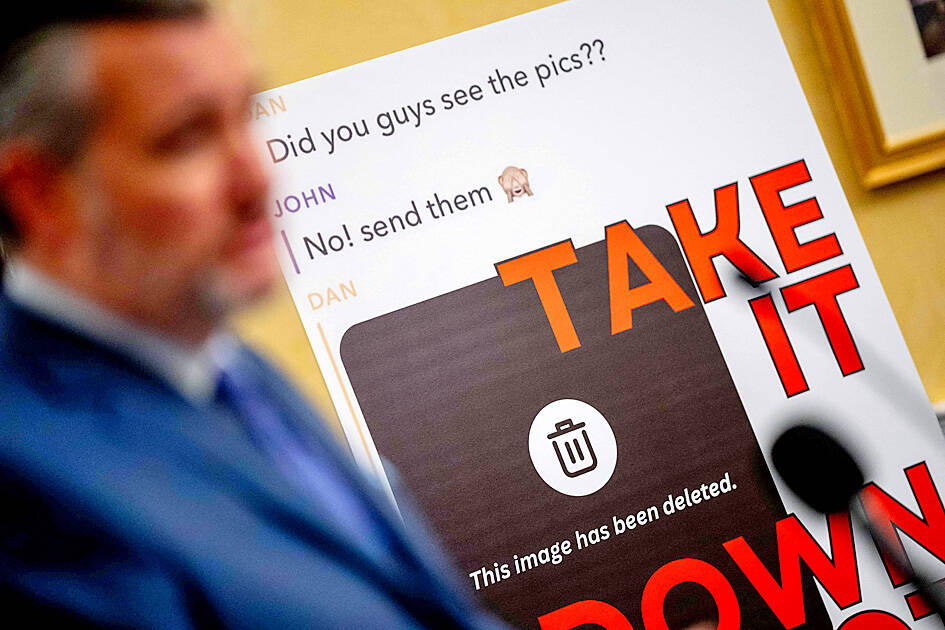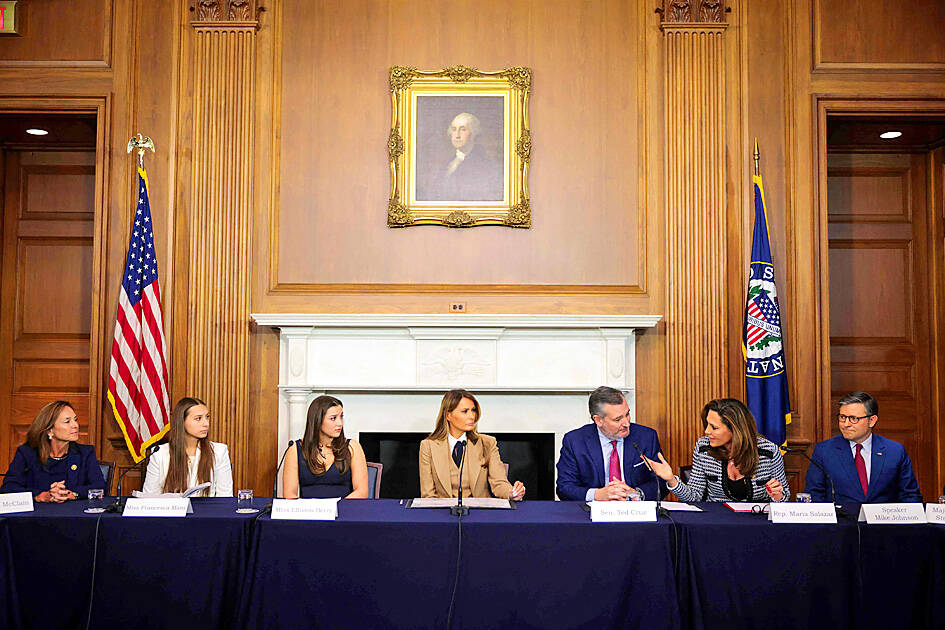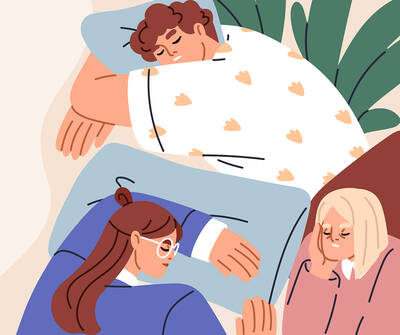US President Donald Trump on Monday last week signed the TAKE IT DOWN ACT (Tools to Address Known Exploitation by Immobilizing Technological Deepfakes on Websites and Networks Act), bipartisan legislation that enacts stricter penalties for the distribution of non-consensual intimate imagery, sometimes called “revenge porn,” as well as deepfakes created by artificial intelligence.
The measure, which goes into effect immediately, was introduced by Sen. Ted Cruz, a Republican from Texas, and Sen. Amy Klobuchar, a Democrat from Minnesota, and later gained the support of First Lady Melania Trump. Critics of the measure, which addresses both real and artificial intelligence-generated imagery, say the language is too broad and could lead to censorship and First Amendment issues.
WHAT IS THE TAKE IT DOWN ACT?

Photo: AP 照片:美聯社
The law makes it illegal to “knowingly publish” or threaten to publish intimate images without a person’s consent, including AI-created “deepfakes.” It also requires Web sites and social media companies to remove such material within 48 hours of notice from a victim. The platforms must also take steps to delete duplicate content. Many states have already banned the dissemination of sexually explicit deepfakes or revenge porn, but the Take It Down Act is a rare example of federal regulators imposing on Internet companies.
WHO SUPPORTS IT?
The Take It Down Act has garnered strong bipartisan support and has been championed by Melania Trump, who lobbied on Capitol Hill in March saying it was “heartbreaking” to see what teenagers, especially girls, go through after they are victimized by people who spread such content.

Photo: AFP 照片:法新社
Cruz said the measure was inspired by Elliston Berry and her mother, who visited his office after Snapchat refused for nearly a year to remove an AI-generated “deepfake” of the then 14-year-old.
Meta, which owns and operates Facebook and Instagram, supports the legislation.
“Having an intimate image — real or AI-generated — shared without consent can be devastating and Meta developed and backs many efforts to help prevent it,” Meta spokesman Andy Stone said in March.

Photo: AFP 照片:法新社
The Information Technology and Innovation Foundation, a tech industry-supported think tank, said in a statement following the bill’s passage last month that it “is an important step forward that will help people pursue justice when they are victims of non-consensual intimate imagery, including deepfake images generated using AI.”
WHAT ARE THE CENSORCSHIP CONCERNS?
Free speech advocates and digital rights groups say the bill is too broad and could lead to the censorship of legitimate images including legal pornography and LGBTQ content, as well as government critics.
“While the bill is meant to address a serious problem, good intentions alone are not enough to make good policy,” said the nonprofit Electronic Frontier Foundation, a digital rights advocacy group. “Lawmakers should be strengthening and enforcing existing legal protections for victims, rather than inventing new takedown regimes that are ripe for abuse.”
“The takedown provision also lacks critical safeguards against frivolous or bad-faith takedown requests. Services will rely on automated filters, which are infamously blunt tools,” EFF said. “They frequently flag legal content, from fair-use commentary to news reporting. The law’s tight time frame requires that apps and Web sites remove speech within 48 hours, rarely enough time to verify whether the speech is actually illegal.”
As a result, the group said online companies, especially smaller ones that lack the resources to wade through a lot of content, “will likely choose to avoid the onerous legal risk by simply depublishing the speech rather than even attempting to verify it.”
(AP)
美國總統川普上週一簽署了《刪除非合意親密影像法案》,這是一項獲共和與民主兩黨支持的立法,旨在對傳播未經同意的親密圖像(有時被稱為「復仇式色情」)以及人工智慧製作的深度偽造影像施以更嚴厲的處罰。
立即生效的該法案,是由德州共和黨參議員泰德.克魯茲,以及明尼蘇達州民主黨參議員艾米.克洛布查所共同提出,後來得到第一夫人梅蘭妮亞.川普的支持。批評者表示,該法案涉及真實圖像與人工智慧生成的圖像,措辭過於寬泛,可能導致審查和美國憲法第一修正案的問題。〔美國憲法第一修正案確立了五項基本自由:宗教、言論、出版、集會之自由,以及向政府請願之權利。〕
什麼是《刪除非合意親密影像法案》?
該法規定,未經他人同意「故意發布」或威脅要發布私密影像(包括以人工智慧製作的「深度偽造」影像)均屬違法行為。該法案還要求網站及社群媒體公司在收到受害者通知後 48 小時內刪除此資料。平台也必須採取措施刪除重複轉貼的這些內容。許多州已禁止傳播深偽色情影像或報復性色情內容,但《刪除非合意親密影像法案》是聯邦政府對網路公司實施監管的罕見例子。
法案的支持者有誰?
《刪除非合意親密影像法案》得到兩黨的大力支持,並獲梅蘭妮亞.川普積極聲援——她於三月在國會山莊進行遊說,表示受害的青少年,特別是女孩,在這些影像被散布後所經歷的一切「令人心碎」。
因為近一年來Snapchat一直拒絕刪除一張用人工智慧生成的這位14歲女孩的「深度偽造」照片。
擁有並經營Facebook和Instagram的Meta公司支持該立法。
Meta發言人安迪.史東在三月時表示:「未經當事人同意而分享私密影像(無論是真實的還是人工智慧生成的),都可能造成毀滅性的後果,Meta開發並支持了許多措施來防止這種情況發生」。
「資訊科技與創新基金會」是一家由科技業支持的智庫,該基金會在上個月該法案通過後發表聲明,稱該法案「向前邁出了重要的一步,將幫助那些非自願親密影像(包括以人工智慧生成的深偽影像)的受害者尋求正義」。
審查制度有何疑慮?
言論自由倡導者及數位權利組織表示,該法案範圍過於寬泛,可能會造成對合法色情內容及LGBTQ內容等合法影像以及批評政府者之審查。
倡導數位權利的非營利組織「電子前哨基金會」表示:「雖然該法案是為了要解決一個嚴重的問題,但光是立意良善並不足以制訂好的政策」。「立法者應加強和執行現有的對受害者的法律保護,而不是發明易被濫用的刪除貼文新制度」。
「該法案還缺乏關鍵保障措施,以防止輕率或惡意要求撤下貼文。服務將依賴自動過濾器,而這些工具是出了名的遲鈍」,電子前哨基金會表示。他們經常標記合法的內容,從合理使用的評論到新聞報導。該法律所規定的時程緊迫,要求應用程式和網站在48小時內刪除言論,這幾乎沒有足夠的時間來核實該言論是否真的違法。
因此,該組織表示,網路公司,尤其是那些缺乏資源來仔細審查大量內容的小型網路公司,「很可能會選擇乾脆刪除該言論,而不是試圖去核實,以規避繁重的法律風險」。
(台北時報林俐凱編譯)

Whether they are a Siamese, Persian, Maine Coon, or Domestic Shorthair, there are hundreds of millions of cats living with people around the world. But despite their popularity as pets, the history of cat domestication has remained difficult for scientists to decipher. A new genome study is providing some insight into the matter by determining the timing of a key milestone in feline domestication - the introduction of domestic cats into Europe from North Africa. Domestic cats pounced into Europe roughly 2,000 years ago in early imperial Roman times, the researchers found, probably thanks to maritime trade. Some of these furry trailblazers

You’re half-asleep with your head resting on the desk during your lunch break. All of a sudden, your leg kicks violently, your head snaps up, and you’re wide awake in a split second. This __1__ sensation is called a “hypnic jerk,” a common phenomenon that strikes just as your body starts to relax, but your brain mistakenly hits the panic button. A hypnic jerk is an involuntary muscle spasm that usually occurs during the __2__ from wakefulness to sleep, especially during the early stages of sleep. As the body begins to relax, muscles loosen and breathing slows down. One

In English, “name idioms” are part of what makes English fascinating. Let’s put a few examples under the microscope. Doubting Thomas This expression stems from the Bible. Thomas, one of Jesus’s disciples, refused to believe Jesus had been resurrected from the dead. He declared he wouldn’t accept it until he could see the nail marks in Jesus’s hands and touch his wounds himself. Today, this idiom refers to someone who won’t believe something without concrete evidence. For instance, if your friend’s expertise is reliable, but you’re still suspicious, you might be a “doubting Thomas.” Smart Aleck The origin of this phrase likely comes from

Scientists at Argentina’s Marambio Station in Antarctica have detected high levels of ammonia gas in the air near an “Adelie penguin” colony. The ammonia, released from nitrogen-rich penguin guano, reacts with sulfur compounds emitted by oceanic plankton to form aerosol particles. These particles boost cloud formation and can sometimes lead to fog. Scientists found that even after the penguins left the area, the remaining guano continued to give off significant amounts of ammonia. Clouds created by the guano can influence the local climate by either reflecting sunlight or trapping heat, depending on environmental conditions. In other words, penguin waste